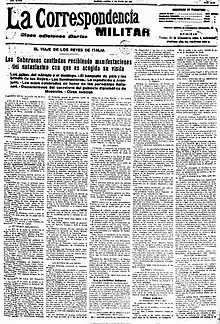 | |
| Type | Daily newspaper |
|---|---|
| Founder(s) | Emilio Prieto Villarreal |
| Founded | 1877 |
| Language | Spanish |
| Ceased publication | 1932 |
| City | Madrid |
| Country | Spain |
| Circulation | 15,950 (as of 1913)[1] |
| ISSN | 1132-6441 |
| OCLC number | 436625960 |
La Correspondencia Militar (The Military Correspondence), also known as La Correspondencia, was a daily newspaper published in Madrid from 1877 to 1932.[2] During its existence it maintained a hawkish editorial line favorable to the Spanish Army.
History
La Correspondencia Militar was founded in 1877 by Commander Emilio Prieto Villarreal.[2][3] It was published Monday through Saturday, with an illustrated Sunday supplement named Militares y Paisanos (Military and Countrymen).[4] It had an initial circulation of 4,000.[5]
Its ideology was hawkish toward all colonial wars of the late 19th century, in addition to its political conservatism and defense of the Army's corporatist interests. In particular it conducted a campaign in defense of the Law of Jurisdictions in 1909. By 1913 it had a circulation of 15,950.[1] During World War I it opted for a Germanophile position.[6] In 1917 it became the de facto mouthpiece for the Juntas de Defensa.[7] Its previous director, Commander Julio Amado, gave way to Evaristo Romero at the head of the publication, although Amado continued to guide its ideology. In the 1920s the paper's circulation dropped considerably.[8]
At the suggestion of the regime of Alfonso XIII and the dictator Miguel Primo de Rivera, the Mallorcan entrepreneur Juan March contributed 100,000 pesetas to shore up the newspaper's finances.[9] However, seeing that it was a ruinous business, March put an end to his assistance in November 1926.[9]
In 1928 La Correspondencia Militar was merged with another pro-military paper, El Ejército Español, of ultraconservative ideology,[8] founded in 1888.[10] It was one of the few publications of its type that survived the establishment of the Second Republic.[11] By 1932, it was simply titled La Correspondencia.[2][10] Its director in the Republican period was Lieutenant Colonel Emilio Rodríguez Tarduchy. Its articles frequently attacked the Republic,[2] which earned it several suspensions. It ceased publication in 1932.[2]
References
- 1 2 Hernández Márquez, Baldemar (2006). Prensa y transición democrática [Press and Democratic Transition] (in Spanish). Universidad Juárez Autónoma de Tabasco. p. 67. ISBN 9789709516203. Retrieved 3 May 2019 – via Google Books.
- 1 2 3 4 5 Checa Godoy, Antonio (1989). Prensa y partidos políticos durante la II República [Press and Political Parties During the 2nd Republic] (in Spanish). University of Salamanca. p. 282. ISBN 9788474815214. Retrieved 3 May 2019 – via Google Books.
- ↑ Desvois, Jean-Michel (2001). "La presse militaire dans l'Espagne contemporaine" [The Military Press in Contemporary Spain]. Les élites et la presse en Espagne et en Amérique latine [Elites and the Press in Spain and Latin America] (in French). Casa de Velázquez. p. 235. ISBN 9788495555182. Retrieved 3 May 2019 – via Google Books.
- ↑ Pascual Martín, Pedro (1 January 1998). "La prensa militar y el 98". XIII Coloquio de Historia Canario-Americana (in Spanish): 269–270. Retrieved 3 May 2019 – via Casa de Colón.
- ↑ Pascual Martín, Pedro (1994). Escritores y editores en la Restauración canovista, 1875–1923 [Writers and Editors in the Canonist Restoration, 1875–1923] (in Spanish). Vol. 1. Ediciones de la Torre. p. 92. ISBN 9788479601003. Retrieved 3 May 2019 – via Google Books.
- ↑ Evans Pim, Joám (11 August 2014). "Pro-German Press and Literature". In Jarazo Álvarez, Rubén (ed.). Press, Propaganda and Politics: Cultural Periodicals in Francoist Spain and Communist Romania. Cambridge Scholars Publishing. p. 99. ISBN 9781443865678. Retrieved 3 May 2019 – via Google Books.
- ↑ Romero Salvadó, Francisco J. (December 2003). "The Great War and the Crisis of Liberalism in Spain, 1916–1917". The Historical Journal. Cambridge University Press. 46 (4): 907. JSTOR 4091600.
- 1 2 Navajas Zubeldia, Carlos (2001). "La salvaguardia de lo permanente. Las extremas derechas militares en la España del siglo XX" [The Safeguarding of the Permanent. The Extreme Military Right in 20th-Century Spain]. Hispania (in Spanish). 61 (207): 74–75. doi:10.3989/hispania.2001.v61.i207.307. hdl:10272/18409. ISSN 0018-2141. Retrieved 3 May 2019.
- 1 2 Cabrera Calvo-Sotelo, Mercedes (11 March 2013). Juan March (1880–1962) (in Spanish). Marcial Pons Historia. p. 155. ISBN 9788415817000. Retrieved 3 May 2019 – via Google Books.
- 1 2 Desvois, Jean-Michel (2001). "La presse militaire dans l'Espagne contemporaine" [The Military Press in Contemporary Spain]. Les élites et la presse en Espagne et en Amérique latine [Elites and the Press in Spain and Latin America] (in French). Casa de Velázquez. p. 236. ISBN 9788495555182. Retrieved 3 May 2019 – via Google Books.
- ↑ Desvois, Jean-Michel (2001). "La presse militaire dans l'Espagne contemporaine" [The Military Press in Contemporary Spain]. Les élites et la presse en Espagne et en Amérique latine [Elites and the Press in Spain and Latin America] (in French). Casa de Velázquez. p. 237. ISBN 9788495555182. Retrieved 3 May 2019 – via Google Books.
External links
- La Correspondencia Militar at the Biblioteca Nacional de España Digital Archive